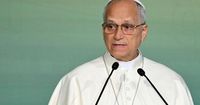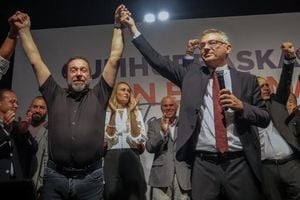On Monday, October 20, 2025, the Vatican witnessed a moment many advocates have long demanded: Pope Leo XIV met for the first time with Ending Clergy Abuse (ECA), a global coalition of sexual abuse survivors and activists. The meeting, held in the Pope’s private office at the Apostolic Palace, marked a historic shift in the Catholic Church’s approach to engaging with organized survivor advocacy—something previous popes had consistently avoided.
According to Reuters, the encounter included four victims and two advocates representing survivors from more than 30 countries. Scheduled for just 20 minutes, the meeting stretched to a full hour, signaling the depth and seriousness of the discussion. Participants described it as “free-flowing” and “a significant moment of dialogue,” underscoring both the gravity of the issue and the willingness—at least in this setting—for honest conversation.
For decades, the Catholic Church has been rocked by scandals involving sexual abuse by clergy and allegations of cover-up at the highest levels. These crises have not only eroded the Church’s moral authority but have also cost it hundreds of millions of dollars in legal settlements worldwide. Despite periodic gestures of contrition, many survivors and advocates have argued that meaningful reform has been too slow or superficial.
The group’s central demand was clear: they urged Pope Leo to extend the United States’ “zero-tolerance” policy on clergy sexual abuse to the entire global Church. Under the US charter, in place since 2002 following the notorious Boston abuse scandal, any priest or deacon found to have committed even a single act of sexual abuse of a minor is permanently removed from ministry. ECA has campaigned for years to see this standard applied universally, arguing that anything less leaves children vulnerable and survivors without justice.
Tim Law, ECA co-founder, told AFP that the group’s goal was “to establish a relationship with him and to get a commitment to ongoing discussion, and he was open to both.” Law described the meeting as a “big step,” “historic,” and “amazing,” emphasizing the significance of the Pope’s willingness to engage directly with advocates rather than limiting contact to individual victims. “He actually used that phrase back to us, about us being in the room, so that we can find out where the resistance is and if there any way we can talk it through,” Law explained to AFP.
Pope Leo did not shy away from acknowledging the challenges ahead. According to Law, the Pope admitted, “there’s great resistance in certain areas of the world to a universal law.” The reasons for this resistance are complex, ranging from cultural differences to entrenched hierarchies within the global Church. Law added, “There’s only so much he can do” as pope, referencing how even recent attempts at reform—such as Pope Francis’s move to allow blessings for same-sex couples—have faced rejection from bishops in some regions, notably Africa.
Despite these obstacles, the survivors left the meeting feeling heard. Gemma Hickey, a Canadian survivor who attended the session, told Reuters, “Pope Leo is very warm; he listened. We told him that we come as bridge-builders, ready to walk together towards truth, justice and healing.” Ugandan survivor Janet Aguti echoed this sentiment, saying, “I left the meeting with hope. It is a big step for us.”
The timing of the meeting was especially poignant. Just days earlier, on October 16, the Vatican’s own Pontifical Commission for the Protection of Minors had issued a scathing report, accusing senior Church leaders of being too slow to provide information and support to victims. The report noted that many churches around the world are still struggling to tackle abuse effectively, despite years of public pressure and repeated promises of reform.
During the meeting, ECA members brought up the recent report, expressing frustration that, in their view, it amounted to “wonderful, lovely words, but there was no action.” Law recounted, “He [Pope Leo] nodded, like he was agreeing. I don’t want to put words in his mouth, but I think he understood.” The Vatican later confirmed the meeting took place, though it did not disclose any details about what was discussed, according to AFP.
Pope Leo XIV, born Robert Prevost in the United States and elected pope in May 2025 following the death of Pope Francis, is no stranger to the issue of clergy abuse. As a bishop in Peru, he served as the point-person for listening to victims in the Peruvian bishops conference, building a reputation for empathy and engagement. But the scale of the problem he now faces is unprecedented. As Matthias Katsch, another meeting participant, put it to Reuters, “I think he is still in a phase where he is trying to find out how to best address these issues. The times where a pope is saying one sentence and everything is settled is over.”
The meeting’s significance also lies in its contrast with the approaches of Pope Leo’s predecessors. While both Pope Francis and Pope Benedict XVI met individually with survivors, they consistently kept activist organizations like ECA at arm’s length. By inviting ECA “into the room,” Pope Leo signaled a new willingness to engage with organized advocacy and perhaps to listen more closely to the collective voices of survivors.
Still, major questions remain. Can the Church overcome internal resistance and enact a universal zero-tolerance policy? What will it take to move from dialogue to action, especially in regions where bishops remain reluctant to embrace reform? And will this meeting be remembered as the start of a new era, or simply another chapter in a long and painful struggle for justice?
For now, participants say they are cautiously optimistic. The commitment to “permanent dialogue” offers hope, but as survivors and advocates have repeatedly emphasized, words must be followed by concrete steps. As Law told reporters, “Why can’t we make it universal?” It’s a question that will likely echo through the halls of the Vatican—and in the hearts of survivors—until real change is achieved.
The world will be watching closely to see whether this historic meeting leads to meaningful reform, or whether resistance within the Church will once again stall progress. For survivors, the stakes could not be higher.




